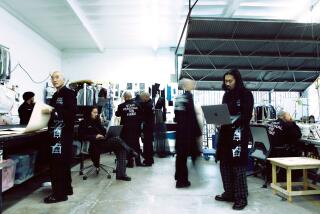Wet Seal Faces Wage Claims
- Share via
In a case being closely watched by California’s estimated $22-billion apparel industry, Wet Seal Inc. is scheduled to go to court today to determine whether it is responsible for some of the wages owed to garment workers who were underpaid by a contractor.
The proceedings in Los Angeles County Superior Court will put a spotlight on a California statute that allows garment workers who weren’t paid minimum wage or overtime to file claims against their employer, as well as the manufacturers or retailers that hired their company as a supplier.
If Wet Seal is found liable, garment industry experts say it would send a message to other retailers that work with sewing contractors: They may have to share the responsibility of ensuring that workers in subcontractor shops are properly paid.
“It would put them on notice that if they act as manufacturers, they can be held accountable as manufacturers,” said Julia Figueira-McDonough, an attorney for the Asian Pacific American Legal Center in Los Angeles. “It’s definitely going to be a seminal case, I think.”
Executives at Wet Seal declined to comment. The Foothill Ranch-based company is one of the nation’s largest merchants of women’s apparel, with annual sales of about $600 million. It operates 620 Wet Seal, Arden B and Zutopia stores in 47 states that carry clothes and accessories for teenage girls and young women under the stores’ names.
Retailers generally have maintained that they are not manufacturers and should not be held liable for the working conditions at other businesses, though many increasingly are using contractors for the production of private-label apparel that is sold only in their stores.
“In theory, anytime there’s a concept that you have to pay for somebody else’s missteps, that’s significant,” said Joseph Beachboard, partner with Ogletree Deakins, a Los Angeles law firm that represents management in labor and employment disputes. “It’s a very disconcerting development.”
The statute, known as AB 633 for the legislation that created it in 1999, could give apparel makers -- who claim they are being besieged by rising health-care and workers’ compensation costs -- one more reason to move out of the state or shift more production overseas, critics say.
AB 633 revised state law that holds manufacturers and merchants jointly liable for subcontractors’ violations of wage and working conditions.
The revamped statute strengthened provisions regarding who is liable when workers are underpaid. Now, anyone who contracts with another to make garments is partially responsible for paying workers minimum wages and overtime if the contractor fails to do so.
The statute also made it easier for the state’s estimated 150,000 garment workers to voice their grievances by allowing them to file complaints with the state labor commission instead of going through the lengthy and expensive process of suing.
“These are people who do work that they are paid very, very little for,” said former state Sen. Tom Hayden, who authored the Senate version of AB 633. “And it’s routine practice for employers to then cheat them out of their wages.”
The Wet Seal case began with the complaint process. It involves four workers -- Rosalba Garcia, Adriana Maria Candelario, Juventina Ochoa and Andrea Beltran -- who, over a period of several years, worked about 68 hours a week for a sewing contractor without ever being paid more than $4 an hour. (The state minimum wage currently is $6.75 an hour, having been increased twice since 1998 when the wage was $5.75.)
The claim, being handled by Cassandra Stubbs of Bet Tzedek Legal Services in North Hollywood, named sewing contractor D.T. Sewing, earlier known as Tommy Sewing, and apparel manufacturer Rad Clothing Inc., both of Los Angeles, as well as Wet Seal.
The labor commission ruled in the workers’ favor last December, awarding them back pay and damages of $240,000, Stubbs said. Wet Seal was deemed liable for nearly $90,000 of that amount.
Both D.T. Sewing and Rad Clothing shuttered their businesses without paying, Stubbs said. Wet Seal appealed the ruling, forcing the non-jury trial that is set to begin today.
Statute proponents say contractors commonly shut down when called to task for back wages. They maintain that retailers and manufacturers should share responsibility because they set the price structure for products, which usually helps determine how much a garment worker is paid for a particular job.
“A lot of contractors don’t last more than two or three years,” said Miles Locker, an attorney with the state labor commission. “A lot of times when workers have a wage claim, that’s the last you see of the contractors.”
The law does not target retailers unless they engage in garment manufacturing. Determining when a retailer also is a manufacturer has become the sticking point in some cases.
According to the state labor commission, the key is whether the retailer contracted directly with the company that is making the clothes, or whether it was so closely involved in the production of the goods that the primary relationship was between the retailer and the sewing contractor.
“The evidence in front of us was that Wet Seal was contracting directly with a business whose own employees were manufacturing the garments,” Locker said.
Stubbs maintains that DT Sewing made clothes only for Rad Clothing, so that the two companies functioned as a single entity. Further, she contends that Wet Seal was intimately involved with all phases of the production process, including design, fabric approval and monitoring sewing.
In an earlier hearing before a labor commission officer, Wet Seal maintained that it was not liable because it was a retailer, but did not present evidence in its own defense, Locker said. The trial in state court will allow the company to present evidence that could cause the judge to come to a different conclusion, he said.
If Wet Seal can show that it was doing business with a manufacturer who then contracted out the work, the retailer should not be liable for back wages, said Joe Rodriguez, executive director of the Garment Contractors Assn. of Southern California.
“If, in fact, Wet Seal followed that chain, then I think they should be off the hook, based on everybody’s consensus these days,” he said.
The law discourages retailers from working directly with contractors, a more economical way of doing business, Rodriguez said.
“No retailer in their right mind wants to register as a manufacturer in California because we have such a crazy jungle of regulation out there,” he said.
More to Read
Inside the business of entertainment
The Wide Shot brings you news, analysis and insights on everything from streaming wars to production — and what it all means for the future.
You may occasionally receive promotional content from the Los Angeles Times.










